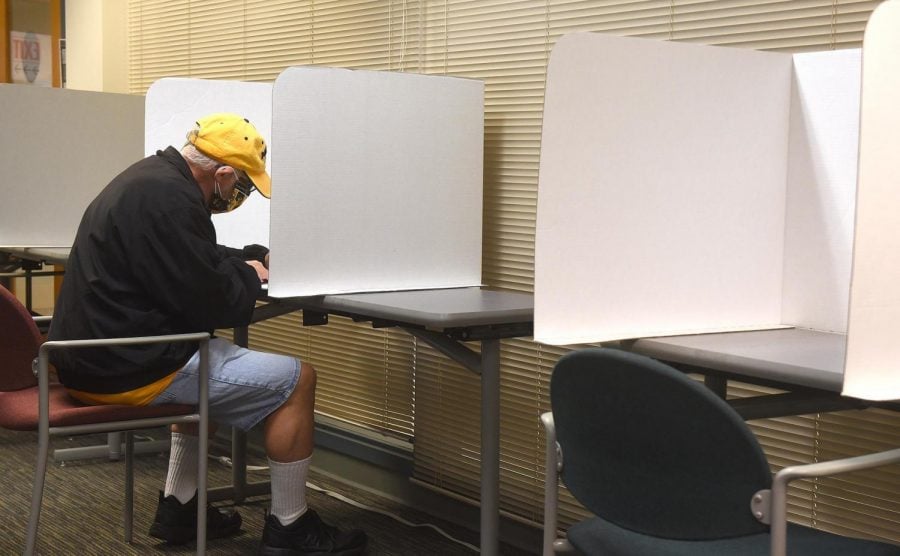Following in-person primary, how will a pandemic general turn out?
As residents remain skeptical of in-person voting in a pandemic, the Illinois House approved a proposal May 21 to send applications for mail-in ballots to anyone who voted by mail in 2018, 2019 or this year’s primary.
May 28, 2020
With few exceptions, Carol Greene has served as an election judge in every election for over a decade, overseeing polling places, assisting voters and building community relationships.
But after spending nearly sixteen hours for the Illinois primary in March in a crowded Haven Middle School room with only a few bottles of hand sanitizer, Greene, a senior citizen, said it’s unlikely she will risk her health by serving as a judge in the 2020 general election.
“I enjoy being an election judge,” Greene said. “That’s one of the ways I get to meet the neighbors and see the little kids. I’ve done it for so long, and I really regret the fact that I don’t think I’m going to do it anymore.”
The next federal general election is scheduled for Nov. 3 — nearly five months away. But some Evanston residents remain skeptical of in-person voting amid a global health crisis. Following the state’s March 17 primary, several Chicago voters and poll workers tested positive for COVID-19, and one election judge, Revall Burke, died.
In Wisconsin, a Republican-led legislature and conservative state Supreme Court blocked efforts to conduct the state’s April 7 election entirely by mail. Over 50 people who voted in person or worked the polls during that election have tested positive for the coronavirus.
The Illinois House approved a proposal May 21 to send applications for mail-in ballots to anyone who voted by mail in 2018, 2019 or this year’s primary. Many Democrats, including Gov. J.B. Pritzker, had hoped to mail ballots, not just applications, to all Illinois voters.
Election judge Debi Winston Buzil said with a potential COVID-19 resurgence in the fall, expanding mail-in voting is critical. Discouraging mail-in and early voting will put many residents at risk, especially the immunocompromised and elderly, she added.
“It’s all of our right to vote,” Winston Buzil said. “We are not an emerging democracy that it should be dangerous to vote.”
Kimberly Polka was especially concerned for older residents at her tightly-packed polling place, which she described as “chaotic.” Some voters weren’t following social distancing protocols, few were wearing masks and hand sanitizer was initially absent. She noticed an older couple leave after another voter got too close to them.
In March, Polka, who’s in her 40s, didn’t believe she was at-risk. But she said uncertainty about the virus has forced her to reconsider her stance.
“Even if there hasn’t been some major resurgence by November, it will be close behind us,” she said. “I no longer feel like I’m not at risk. I think a lot of people feel like ‘I’m young, I’ve got good lungs, I’ll be okay.’ But we really don’t know.”
While Polka typically volunteers out-of-state on Election Day and votes absentee, when in Illinois she said she looks forward to in-person voting. This year, she will mail a ballot from home.
She’s especially worried about the election outcome in states without accessible mail-in voting, where protests of stay-at-home orders are more common, she said. Polka said she fears people who take to the polls in those states are those who aren’t taking the pandemic seriously.
In states prioritizing in-person voting, going to the polls means people may have to “choose between literally their life and voting,” Polka said. It’s a difficult decision, but one she’s reluctantly determined.
“I think I would probably choose my life,” Polka said. “And I’ve never missed an election.”
Email: [email protected]
Twitter: @herscowitz












